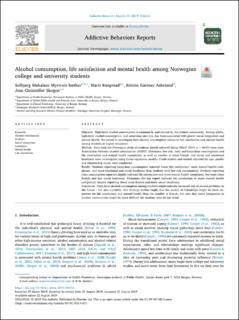| dc.contributor.author | Sæther, Solbjørg Makalani Myrtveit | |
| dc.contributor.author | Knapstad, Marit | |
| dc.contributor.author | Askeland, Kristin Gärtner | |
| dc.contributor.author | Skogen, Jens Christoffer | |
| dc.date.accessioned | 2020-03-25T15:36:50Z | |
| dc.date.available | 2020-03-25T15:36:50Z | |
| dc.date.created | 2019-10-29T16:10:18Z | |
| dc.date.issued | 2019 | |
| dc.identifier.citation | Addictive Behaviors Reports. 2019, 10 1-9. | |
| dc.identifier.issn | 2352-8532 | |
| dc.identifier.uri | https://hdl.handle.net/11250/2648685 | |
| dc.description.abstract | Objective
High-level alcohol consumption is common in, and central to, the student community. Among adults, high-level alcohol consumption, and sometimes also low, has been associated with poorer social integration and mental health. We aimed to investigate how alcohol consumption relates to life satisfaction and mental health among students in higher education.
Methods
Data from the Norwegian study of students' health and well-being (SHoT, 2014, n = 9632) were used. Associations between alcohol consumption (AUDIT; abstainers, low risk, risky and hazardous consumption) and life satisfaction and mental health complaints, as well as number of close friends, and social and emotional loneliness were investigated using linear regression models. Crude models and models adjusted for age, gender and relationship status were conducted.
Results
Students reporting hazardous consumption reported lower life satisfaction, more mental health complaints, and more emotional and social loneliness than students with low risk consumption. Students reporting risky consumption reported slightly reduced life satisfaction and more mental health complaints, but more close friends and less social loneliness. Abstainers did not report reduced life satisfaction or more mental health complaints, despite reporting fewer close friends and more social loneliness.
Conclusion
High-level alcohol consumption among students might indicate increased risk of several problems in the future – but also currently. Our findings further imply that the quality of friendships might be more important for life satisfaction and mental health than the number of friends, but also that social integration in student communities might be more difficult for students who do not drink. | |
| dc.language.iso | eng | |
| dc.rights | CC BY-NC-ND 4.0 | |
| dc.rights.uri | https://creativecommons.org/licenses/by-nc-nd/4.0/ | |
| dc.title | Alcohol consumption, life satisfaction and mental health among Norwegian college and university students | |
| dc.type | Peer reviewed | |
| dc.type | Journal article | |
| dc.description.version | publishedVersion | |
| cristin.ispublished | true | |
| cristin.fulltext | original | |
| cristin.qualitycode | 1 | |
| dc.identifier.doi | 10.1016/j.abrep.2019.100216 | |
| dc.identifier.cristin | 1741814 | |
| dc.source.journal | Addictive Behaviors Reports | |
| dc.source.volume | 10 | |
| dc.source.pagenumber | 1-9 | |

